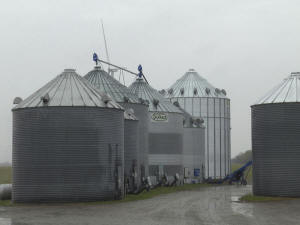Farmers fear tariffs could cost them one of their biggest markets in
China
[April 05, 2025] By
JOSH FUNK
OMAHA, Neb. (AP) — Heading into this year, most U.S. farmers were hoping
to break even or maybe record a small profit if they could find a way to
limit their sky-high costs. But now they are faced with losing the
biggest export market for many of their crops after China retaliated
against President Donald Trump's tariffs.
“There's just not any margin for error in the current farm economy,”
said Kentucky farmer Caleb Ragland, who serves as president of the
American Soybean Association.
Soybean and sorghum farmers have particular reason to worry because at
least half of those crops are exported and China has long been the
biggest buyer. China has also bought a lot of American corn, beef,
chicken and other crops as part of spending $24.65 billion on U.S.
agricultural products last year. Now with China slapping 34% tariffs on
all American products Friday — on top of other tariffs it imposed
earlier this year — all of those products will be significantly more
expensive in China
Crop prices, much like the stock market, dropped after Trump announced
his tariffs earlier this week.
Tim Dufault, whose farm is in northwest Minnesota only about 80 miles
south of Canada, said in a good year soybean farmers might make $50 to
$75 an acre. But this isn't a good year because crop prices aren't high
enough to cover soaring costs, and the price drop in the past two days
cost them about $25 an acre, he said.
Dufault said he is worried that these new tariffs might put many farmers
out of business, including the young farmers he rented his land to
heading into this year as he retired because they likely won't make
anything in 2025.

“I just I hope to God they can stay in business,” said Dufault, who is
active with the Farmers for Free Trade group that pushes for open
markets.
One of the biggest long-term concerns is that American farmers and
ranchers will lose market share as China turns to Brazil and other
countries to buy the soybeans, beef, chicken and other crops it
consumes. China will buy lots of sorghum because it is distilled into
the drink baijiu that is as popular there as whiskey is in the United
States, but they will get it from other countries.
Farmers endured Trump's previous trade war with China during his first
term. But this time, Trump's tariffs extend around the globe, so China
likely won't be the last country to retaliate with tariffs of its own.
Could farmers get government aid?
The only way most farmers survived Trump's last trade war was with tens
of billions of government aid payments, but it's not clear if he will do
that this time. He gave them more than $22 billion in aid payments in
2019 and nearly $46 billion in 2020, though that year also included aid
related to the COVID pandemic.
[to top of second column] |

Grain bins stand on the farm that Bryant Kagay works with his father
and grandfather in Amity, Missouri, Friday, April 4, 2025. (AP
Photo/Nick Ingram)
 Agriculture Secretary Brooke Rollins
told Fox News this week that right now she doesn't believe massive
aid payments will be necessary, although she won't know that for
several months. "But if it is, then this president has always said
and he is resolute in his commitment to our farmers and our ranchers
and our great rural communities in America, so we will we’ll make
sure we’re ready if in fact that is necessary,” she said.
“But none of us like that,” said farmer Andy Hineman, who is vice
president of the Kansas Grain Sorghum Producers Association. “We
don’t want to live on government handouts. We’d rather sell the
crops we grow.”
But farmer Bryant Kagay, part owner of Kagay farms in Amity,
Missouri, said he doesn’t “have a lot of faith that these tariffs —
the way they are laid out today — will stick around long term.”
He also doesn't like the idea of getting aid from the government.
“I really hate that seems to be the solution that, well, we’ll just
pay farmers some just off-the-cuff payment to help offset this,”
Kagay said. “I think a federal government that’s vastly overspending
today, like this is not the way to solve that problem.”
The hope for farmers is that Trump’s tariffs will lead to
negotiations with other countries that will lower tariffs and other
trade barriers.
“That’s the type of positive development that we can do that’s good
for everybody involved, and that’s what we need to look for,”
Ragland said. “Instead of beating each other up with higher and
higher tariffs — it’s just like punching each other in the face.
We’re not going to gain anything from it. It’s just going to cause
us to hurt. That would be my encouragement to the administration, is
to look for opportunities and get some great deals done
proactively.”
___
Associated Press writer Nick Ingram contributed to this report from
Missouri.
All contents © copyright 2025 Associated Press. All rights reserved
 |